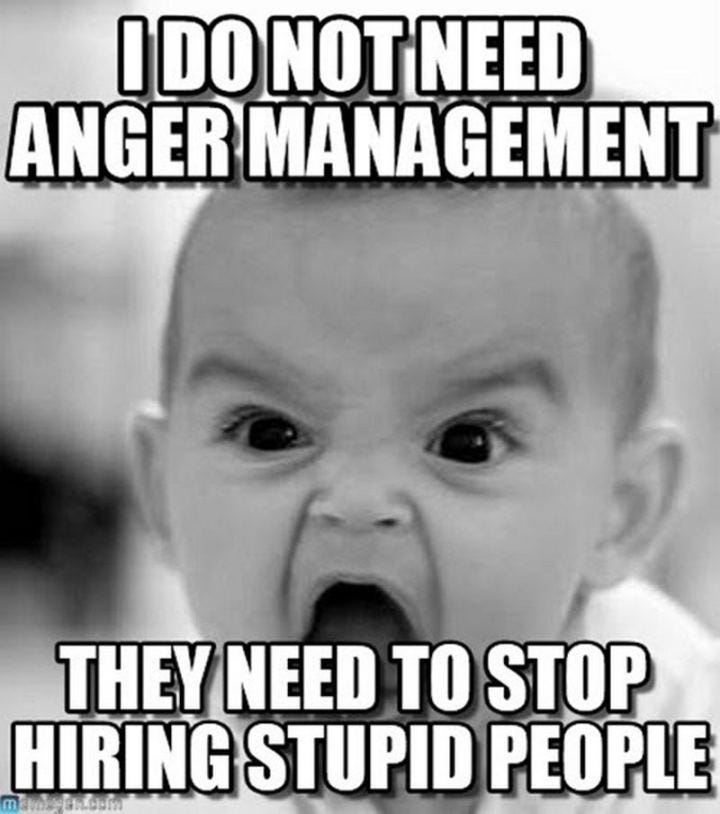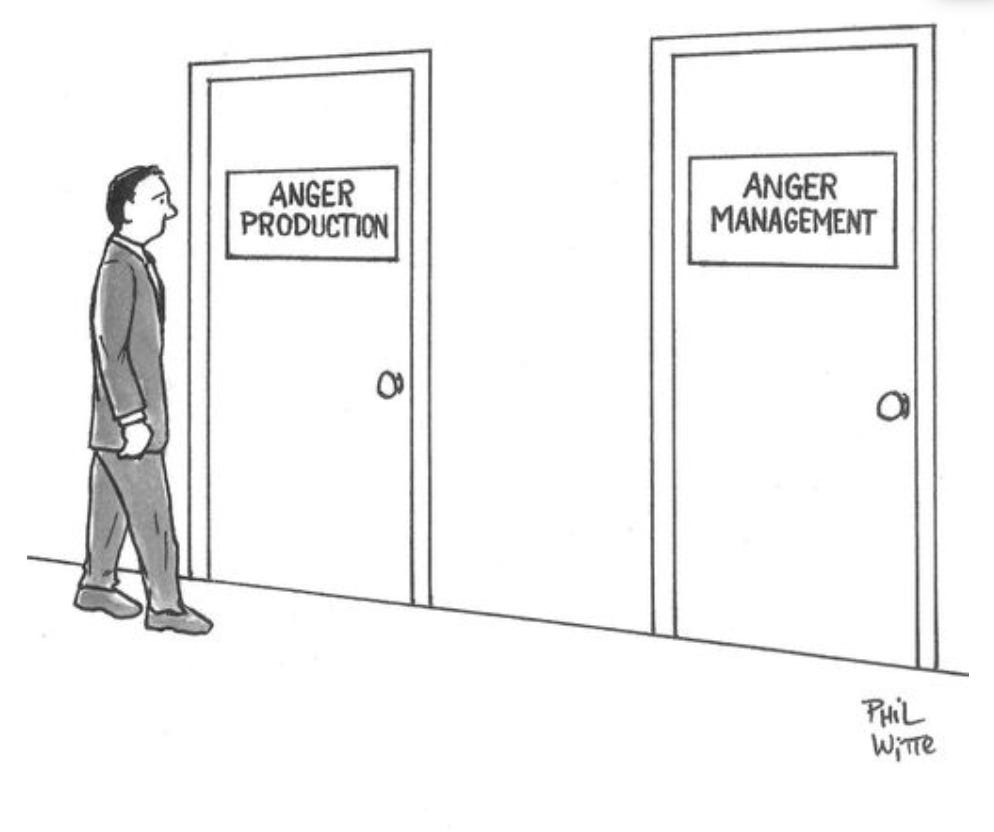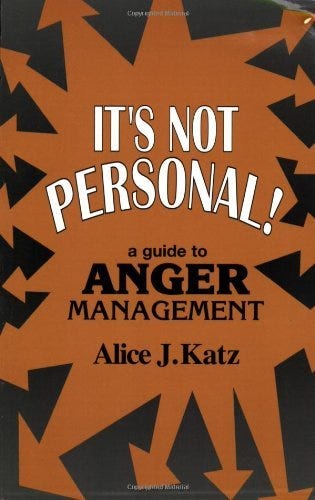Anger management made me a better leader
Why I believe every people manager should learn the basics of anger management, and how it helped me become more self-aware
👋 Hey, it’s Wes. Welcome to my weekly newsletter where I share frameworks for becoming a sharper marketer, operator, and builder. If you’re not a subscriber, here’s what you missed this month:
Subscribe to get access to these posts, and all future posts.
In this week’s newsletter, we’ll cover why understanding the basics of anger management will make you a better leader and people manager, even if (you think) you don’t have anger issues.
Why anger doesn’t necessarily mean shouting and throwing mugs
The impact of anger when you’re an individual contributor vs a manager
How learning the basics of anger management led to more peace of mind
If you find this helpful, please share it with your friends and colleagues. Let’s dive in.
Read time: 8 minutes
In 2016, I picked up a book on anger management and it changed my life. After reading it, I came to believe every leader should study the basic principles of anger management. But Wes, I don’t have anger issues, you say. In my opinion, anger management is really about self-awareness, emotional regulation, and self-management—areas every leader benefits from digging into.
First, here’s the disclaimer: I am not a psychologist, therapist, or medical professional. I am a founder, marketing executive, and leader with 15 years in industry, and I’m speaking from my own personal experience with anger management, how it helped me, and how I think it could help other leaders. Okay, onwards.
If you're a people manager—even if you manage one person unofficially—I believe you’ll be happier and have happier employees, if you invest in learning the basics of anger management. Here’s why:
Every modern professional knows you have to deal with a certain amount of BS at work. There are times you’ll be tempted to lash out at others.
A lot of what we feel with jealousy, resentment, frustration, etc is often rooted in anger. Anger management will teach you how to process your feelings, so you can be more in control of yourself.
As a manager, you have an outsized impact on the lives of your direct reports and teams. According to a 2023 study by The Workforce Institute, managers impact employees’ mental health more than doctors or therapists—and have the same impact as a spouse or partner.
When managers are in control of your emotions, you’ll benefit by having higher team morale, stronger relationships, lower churn/higher retention, and more productivity.
On the flip side, it’s possible people might be projecting their anger at you. You may have a temperamental manager or passive-aggressive coworker. You can learn how to recognize when that’s happening, so you can protect yourself.
Picking up a book about anger management feels like admitting to a taboo problem you're pretty certain you don’t have. Or worse, people might think you have an issue. (And this isn’t one of those “negative” traits that’s actually positive, like being too responsible.) No, “anger issues” sounds like pure, straight-up downside.
Still, I'm bringing this up because after working full-time reporting to managers of all kinds, being a founder, and being a manager myself, I now have the suspicion that many founders and leaders may low-key have anger issues, to varying degrees.
That’s why I believe we (the collective “we”) could benefit from studying the basics of anger management, as simply another tool that makes us better at understanding the world and ourselves.
Annoying things are bound to happen at work
Let’s be honest: There’s a lot to potentially be angry about at work. Anger isn’t rage. Sometimes anger is feeling frustrated, disappointed, or powerless, which most of us have felt at some point.
Here is a short list of annoying things that can happen at work:
You feel like your boss is taking their frustration out on you.
Your coworker misunderstood you, even though you were pretty clear, and now things are weird and you have to decide if/how to address it.
You thought it would take three months to hire a new team member, but it’s been eight months and you’re wondering why things can’t just work once in a while.
Your direct report said they’d handle the thing, but it’s not handled, and worse, you had to check in with them to realize it wasn’t handled.
An important customer emailed half of your leadership team and insinuated your team wasn’t doing their job.
You ran a growth experiment that everyone agreed would probably fail, but there would be high upside if it worked. Now, they’re shocked it isn’t working and demanding to know why.
Your manager consistently praised you for doing incredible work all year, but your latest project was a wash. Performance reviews are next month. Unfortunately, your boss is more susceptible than most to recency bias.
This is just a sampling of things that could go wrong at work, which shows how likely it is that you will inevitably get frustrated at one thing or another. You’ll use anger management skills eventually, perhaps sooner rather than later.
The hidden cost of angry leaders
My hypothesis is angry managers and leaders account for millions of lost GDP per year.
Something happens.
The CEO’s reaction is anger, or some form of it—lashing out, projecting, blaming.
The CEO takes this anger out on 3 executives.
These three executives now feel unfairly punished, threatened, and on edge.
They spend the rest of the day trying to shake it off and get back into a normal headspace.
In the meantime, the three executives each meet with half a dozen team members. The execs are irritated and don’t give the benefit of the doubt like they usually do.
Each of these 18 team members leave wondering, Is this my fault?
The three executives bring this home to their spouses.
That night, each person spends time strategizing whether their boss’ harsh words today were real and how to bring it up, if at all.
All this time that team members spend trying to shake off their manager’s anger could be spent on productive work.
Whether you acknowledge it or not, your words as a leader matter. You can tell people not to take you too seriously, but they still will. Even people with thick skin who aren’t as easily affected, are still at least a little affected.
Second-order effects: The impact of anger from individual contributors vs managers
If you’re in a leadership role, you are probably more intense than the average person and this is generally a strength.
Then you layer on situational factors of being a leader: You're under pressure to drive revenue, everything is taking longer than you think, and the strategic bet you made isn’t paying off.
This understandably creates a lot of strong feelings. Where does this frenetic energy go? When you feel threatened, backed into a corner, impatient, confused, scared—where does this energy go?
Before you were a people manager, you handled it in your own way. You tried to stay calm at work, then after work, you:
vented to a friend
talked to your spouse
journaled
complained to your therapist
screamed into your memory foam pillow
Then you became a manager. Now, you have direct reports—real humans, who range from new grads to senior leaders—who rely on you. Folks watch your behavior when you don’t think they’re watching, and your words hold more weight.
Now, you have more eyes on you.
Where do these strong feelings go?
When you become a manager, you still have all the worries you had as an individual contributor, but now:
You’re heading into the 12pm weekly Product Review meeting with fifteen cross-functional team members awaiting your feedback.
You have a 1:1 with one of your direct reports to troubleshoot what’s going wrong with the upcoming launch.
You’re getting off a call where you feel the CEO was unfair to you, and you’re going straight into a meeting with your team of 5 direct reports.
So where does this frenetic energy go? If we're not careful, it goes to our teams. That's where it goes.
The thing I learned when studying anger management is that anger isn't always shouting and throwing mugs. This might have been how anger was expressed in the 1960s. But in 2023, snarling and pounding your fists is no longer acceptable in most work environments, and most leaders know this.
Instead, anger expresses itself as resentment. Stone-walling. Put-downs. Ridicule. Blame. Frustration that's disproportionate compared to the actual infraction. It's much more subtle, but warrants addressing nonetheless.
Especially early in my career, I didn't know how to handle my own emotions. In the moment, I felt justified and even morally superior. When I realized I was doing what other leaders had done to me, I felt surprised and ashamed. How could I be doing what I said I would never do when I came into a position of leadership?
Do it for your own peace of mind
The reason I picked up the anger management book was because I got tired of taking things personally and feeling so affected by frustration. I’m still working on this, and I will always be more intense than people whose baseline nature is to let things roll off. There are people out there who don’t even notice when someone slights them because they’re so relaxed and good-natured. I’d love to know what that feels like.
When I was building the altMBA with Seth Godin, I dealt with customers, blog readers, students, etc who often said mean things when they were frustrated. If you accept $1 from someone, some customers feel like they own you. If that was the price of admission for building cool stuff and putting it out into the world, I was willing to pay it, but I wanted to learn how to get less upset.
I decided it was time to invest in learning to control my emotions. Once I got over the discomfort of picking up a book about anger management, I realized this was exactly what I needed to give myself the vocabulary to put into words what these big feelings were and what to do with them.
If you’re curious, the book I read and highly recommend is It’s Not Personal by Dr. Alice Katz, a cognitive psychotherapist. According to Amazon, it’s currently out of print, which is shocking because it’s so good, but it probably hasn’t been marketed since it was written in 1996. I’m sure there are many other books on this topic that are worthwhile, so you can find an alternative. In either case, I can confidently say that the $13 I spent reading about the basics of anger has paid off thousands of times over, maybe more, in the 8 years since I picked it up.
[UPDATE: Thank you to reader Jodie L for finding a copy of the book in the Internet Archives.]
I’ve recommended this book to close friends, but never spoke about it publicly because I didn’t want people to judge me. I even mailed the book to a relative and ex-boyfriend because I genuinely thought it would help them. To the surprise of no one, I didn’t hear back from either.
I want to close by saying that reading about anger management isn't admitting to yourself that you have anger issues, and even if it is, who cares? I don't care if you say you have anger issues or not. You don’t have to tell your coworkers. I never told my coworkers, except Seth Godin who I told about the book, and he miraculously got Dr. Katz on the phone ten minutes later and I told her how much I loved her book. I think she said she had retired and is a painter now.
This isn't about shaming people or forcing them into admitting anything. This is about you investing in being more aware of your own emotions, so you can be the thoughtful leader you already are most of the time. I did it and it changed my life, my relationship with myself, and my relationship with teams who have placed their trust in me to be their leader. My hope is that it does the same for you.
I’d love to get your help growing our community of thoughtful, rigorous operators. If you found this valuable, consider taking a moment to refer a friend or subscribing if you haven’t already. For top referrers, I put together a list of my favorite books and not-yet-published spiky points of view.
Thanks for being here,
Wes Kao
PS See you next Wednesday at 8am ET.






This is great - thanks for sharing. I went into a step study because of my anger issues and then went straight into therapy from there. I'm so much more calm today. I still have those knee jerk reactions from time to time, and I'm much faster and bringing myself down and apologizing for my behavior.
Thank you for sharing this and being open about your experience! Anger feels like something everyone must experience but then also feels like I’m the only one. I picked up the book, “Never Get Angry Again” when I was reading a ton of self help in 2022 and I really felt like it was one of the most impactful books I read. My takeaway was that a lot of my own anger was rooted in a lack of self confidence due to a lack of action. I changed so much because of it!
This made me laugh, “I even mailed the book to a relative and ex-boyfriend because I genuinely thought it would help them. To the surprise of no one, I didn’t hear back from either.”